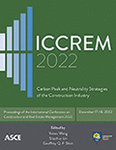The Antecedents of Villagers’ Initial Trust in the Developer in Urban Village Redevelopment Projects
Publication: ICCREM 2022
ABSTRACT
Trust between villagers and the developer is indispensable to the success of urban village redevelopment project (UVRP). Although extensive studies have explored the antecedents of trust between participants in construction projects, those in UVRP are less studied. The villagers are inexperienced but vulnerable in UVRP, who may lose their property once the project fails. Thus, they are cautious of initial trust establishment on developer due to the lack of previous knowledge of and interactions with the developer, which denotes the uniqueness of initial trust establishment in UVRP. As such, this study aims to explore the antecedents of villagers’ initial trust on the developer grounded on literature review and case analysis on four UVRPs in Guangzhou, China. The results show that there are 14 antecedents of villagers’ initial trust on the developer, which are classified into the characteristics of the developer, the villagers, the institutional environment, and the boundary spanners.
Get full access to this article
View all available purchase options and get full access to this chapter.
REFERENCES
Du, Y. L., and Yan, P. (2014). “An empirical study about formation mechanism of initial trust in PPP projects.” China Civil Engineering Journal, 47(4), 115–124. (in Chinese).
Fang, S. Q., and Xiong, J. (2021). “Research on the mechanism of the initial trust motivation of rural residents to tourism developers: Base on the survey data of 217 rural residents in Hunan and Guangxi” Resource Development & Market, 37(09), 1099–1107. (in Chinese).
Friedma, R. A., and Podolny, J. (1992). “Differentiation of boundary spanning roles: Labor negotiations and implications for role conflict.” Administrative Science Quarterly, 37(1), 28–47.
Jiang, W. P., Lu, Y. J., and Le, Y. (2016). “Trust and project success: A twofold perspective between owners and contractors.” Journal of Management in Engineering, 32(6), 4016022.
Khalfan, M. M. A., McDermott, P., and Swan, W. (2007). “Building trust in construction projects.” Supply Chain Management-An International Journal, 12(6), 385–391.
Li, X., Zhang, F., Hui, E. C., and Lang, W. (2020). “Collaborative workshop and community participation: A new approach to urban regeneration in China.” Cities, 102, 102743.
Liu, L., and Xu, Z. H. (2018). “Collaborative governance: A potential approach to preventing violent demolition in China.” Cities, 79, 26–36.
Liu, R., Wong, T. C., and Liu, S. (2012). “Peasants’ counterplots against the state monopoly of the rural urbanization process: urban villages and ‘small property housing’ in Beijing, China.” Environment and Planning A, 44(5), 1219–1240.
Manu, E., Ankrah, N., Chinyio, E., and Proverbs, D. (2015). “Trust influencing factors in main contractor and subcontractor relationships during projects.” International Journal of Project Management, 33(7), 1495–1508.
Mayer, R. C., Davis, J. H., and Schoorman, F. D. (1995). “An integrative model of organizational trust.” Academy of Management Review, 20(3), 709–734.
Mcknight, D. H., Cummings, L. L., and Chervany, N. L. (1998). “Initial trust formation in new organizational relationships.” Academy of Management Review, 23(3), 473–490.
Pinto, J. K., Slevin, D. P., and English, B. (2009). “Trust in projects: An empirical assessment of owner/contractor relationships.” International Journal of Project Management, 27(6), 638–648.
Rousseau, D. M., Sitkin, S. B., Burt, R. S., and Camerer, C. (1998). “Not so different after all: A cross-discipline view of trust.” Academy of management review, 23(3), 393–404.
Tai, S., Sun, C., and Zhang, S. (2016). “Exploring factors affecting owners’ trust of contractors in construction projects: a case of China.” Springerplus, 5(1), 1783.
Tan, X. H., Altrock, U., Schoon, S., and Zhao, J. (2019). “Localized place-making and the knowledge-based regeneration strategies: The case of Xiasha Village in Shenzhen.” Habitat International, 83, 73–84.
Tong, D., Wu, Y. Y., MacLachlan, I., and Zhu, J. M. (2021). “The role of social capital in the collective-led development of urbanising villages in China: The case of Shenzhen.” Urban Studies, 58(16), 3335–3353.
Van Meerkerk, I., and Edelenbos, J. (2013). “The effects of boundary spanners on trust and performance of urban governance networks: Findings from survey research on urban development projects in the Netherlands.” Policy Sciences, 47(1), 3–24.
Wang, D. D., Li, K. L., and Fang, S. Z. (2018). “Analyzing the factors influencing trust in a construction project: Evidence from a Sino-German Eco-Park in China.” Journal of Civil Engineering and Management, 24(4), 331–343.
Wang, R. Y., and Huang, L. (2021). “Unpacking market-oriented land governance and its performance differences: Empirical evidence from urban land redevelopment in contemporary China.” Habitat International, 118, 102473.
Wong, P. S. P., Cheung, S. O., and Ho, P. K. M. (2005). “Contractor as trust initiator in construction partnering: Prisoner’s dilemma perspective.” Journal of Construction Engineering and Management, 131(10), 1045–1053.
Wong, W. K., Cheung, S. O., Yiu, T. W., and Pang, H. Y. (2008). “A framework for trust in construction contracting.” International Journal of Project Management, 26(8), 821–829.
Yuan, D. H., Yau, Y., Bao, H. J., and Lin, W. Y. (2020). “A framework for understanding the institutional arrangements of urban village redevelopment projects in China.” Land Use Policy, 99, 104998.
Zhang, L. Z., and Ye, Y. M. (2021). “Villagers’ willingness to urban village redevelopment from the perspective of prospect theory: A study based on questionnaire survey of 25 Urban Villages in Guangzhou.” Modern Urban Research, 2021(12), 19–26. (in Chinese).
Zhang, Y. B., Wang, Y. S., and Yao, H. J. (2021). “How does the embeddedness of relational behaviours in contractual relations influence inter-organisational trust in construction projects?” Engineering, Construction and Architectural Management, 29(1), 222–244.
Zhang, Z. T., Liu, Y., and Liu, G. W. (2022). “Rethinking growth coalition in urban village redevelopment: an empirical study of three villages in Zhuhai, China.” Habitat International, 121, 102529.
Zheng, H. W., Shen, G. Q., and Wang, H. (2014). “A review of recent studies on sustainable urban renewal.” Habitat International, 41, 272–279.
Information & Authors
Information
Published In
History
Published online: Dec 15, 2022
Authors
Metrics & Citations
Metrics
Citations
Download citation
If you have the appropriate software installed, you can download article citation data to the citation manager of your choice. Simply select your manager software from the list below and click Download.
